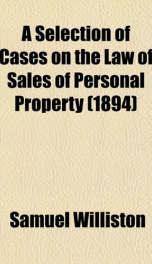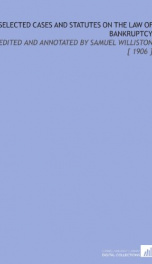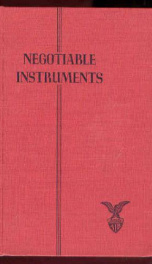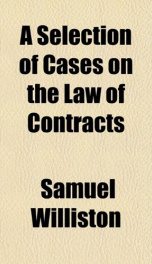a selection of cases on the law of sales of personal property

Purchase of this book includes free trial access to www.million-books.com where you can read more than a million books for free. This is an OCR edition with typos. Excerpt from book: CHAPTER II. EXECUTORY AND EXECUTED SALES. SECTION I. Unconditional Sales Op Specific Goods To Which Nothing Re- Mains TO BE DONE. NOY'S MAXIMS. 1641. Chapter XLII. In all agreements there must be quid pro quo presently, except a day be expressly given for the payment, or else it is nothing but communication. If a man do agree for a price of wares he may not carry them away before he hath paid for them. But the merchant shall retain the wares until he be paid for them, and, if the other take them, the merchant may have an action of trespass or an action of debt for the money at his choice. If the bargain be that you shall give me ten pound for my horse and you do give me a penny in earnest which I accept, this is a perfect bargain. You shall have the horse by an action of the case, and I shall have the money by an action of debt. If I say the price of a cow is four pound, and you say you will give me four pound and do not pay me presently, you may not have her afterwards, except I will, for it is no contract. But if you go presently to telling of your money, if I sell her to another you shall have your action of the case against me If I sell my horse for money, I may keep him until I am paid, but I cannot have an action of debt until he be delivered, yet the property of the horse is by the bargain in the bargainee or buyer; but if he does presently tender me my money, and I do refuse it, he may take the horse or have an action of detainment. And if the horse die in my stable between the bargain and the delivery, I may have an action of debt for my money, because by the bargain the property was in the buyer. JAMES TABLING v. BAXTER. In The King's Bench, Hilaey Term, 1827. [Reported in 6 Bamewall $- Cresswell, 360.] Assumpsit to recover back £145 pai...
Info about the book
Author:
Series:
Unknown
ISBN:
1600421695
Rating:
5/5 (9)Your rating:
0/5
Languge:
English
Users who have this book
Users who want this book
What readers are saying
What do you think? Write your own comment on this book!
write a commentif you like a selection of cases on the law of sales of personal property try:
Do you want to exchange books? It’s EASY!
Get registered and find other users who want to give their favourite books to good hands!





